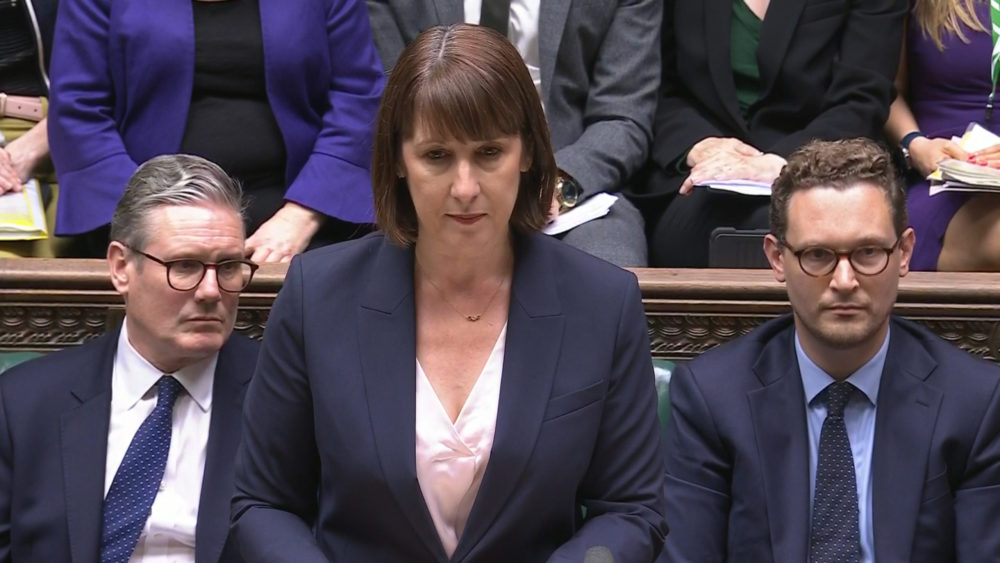Reeves repeatedly declines to guarantee no more borrowing or tax rises

Rachel Reeves has repeatedly declined to guarantee that there will be no more borrowing or tax rises following her first Budget, as MPs pressed the Chancellor on her previous pledge.
Shadow chancellor Mel Stride asked whether Downing Street has “changed its mind”, or if Ms Reeves “spoke without thinking” when she told business chiefs she would not repeat her Budget hikes.
At the Confederation of British Industry conference in November, the Chancellor sought to reassure business leaders there would be no repeat of the £40 billion tax hikes announced in her first Budget, insisting that the public finances had been put on a stable footing and services would now have to live within their means.
‘Clear’
“I’m really clear, I’m not coming back with more borrowing or more taxes,” she said.
Ms Reeves was asked multiple times to re-commit to no more borrowing or taxes at Treasury questions on Tuesday, to which she replied that the Government will “never have to repeat a Budget like that”.
In the Commons, Mr Stride said: “When she recently pledged to the CBI that she would not be raising taxes again, did she mean it?”
‘Black hole’
Ms Reeves replied: “At the Budget in October, which (Mr Stride) knows, we had to fix a £22 billion black hole in the public finances, and of course some of that black hole comes from the fact that we are the only G7 economy where employment is lower than it was before the pandemic, when he was presiding as work and pensions secretary in the previous government.
“So we did have to raise taxes to fund our public services, but never again will we have to repeat a Budget like that, because we have now wiped the slate clean and drawn a line under the mess created by the last government.”
Mr Stride then said: “No 10 have now stated that they are not prepared to stand by her commitment on tax, so could I ask (Ms Reeves), is this because No 10 changed its mind, or is it because (Ms Reeves) spoke without thinking?”
‘Chaos’
Ms Reeves replied: “No chancellor is going to write five years worth of Budget in their first five months as chancellor of the Exchequer, but what I can say is that we will never have to deliver a Budget like that again, because we took the decisions in this Budget to wipe the slate clean after this mismanagement and decline and chaos of the previous government.”
At last week’s Prime Minister’s Questions, Sir Keir Starmer also appeared to row back from Ms Reeves’s earlier pledge when questioned by Tory Leader Kemi Badenoch.
“I’m not going to write the next five years of budgets here at this despatch box, but we said we wouldn’t hit the payslips of working people. We’ve passed the Budget. We’ve invested in the future, and we’ve kept that promise,” the Prime Minister said.
On Tuesday, Conservative MP Nick Timothy (West Suffolk) also asked Ms Reeves to repeat her own words, saying: “Last week the Chancellor told the CBI conference that she wouldn’t ‘come back with more borrowing or taxes’. Last Wednesday the Prime Minister hung her out to dry and refused to repeat those words.
“So will she repeat them today and rule out any more borrowing or any more taxes, yes or no?”
Ms Reeves replied: “At the Budget in October we had to fill the £22 billion black hole left by the previous government. We will never have to repeat a Budget like that because we won’t ever have to clear up the mess of the previous government ever again.”
Elsewhere, shadow Treasury minister Richard Fuller said the Government “seems to specialise in creating economic uncertainty”, adding: “With the latest being a delay in the date for the critical multi-year spending review.
“It looks like the Chancellor either doesn’t have a grip on her Cabinet colleagues’ spending plans or her own plans for public sector productivity. Which is it, or is it both?”
‘Damage’
Ms Reeves, in her reply, said: “(Mr Fuller) talks about uncertainty when he was a minister in the Treasury under Liz Truss and the huge damage that did to family finances and business finances, so frankly I will take no lessons from him on how to run the economy.
“We’ve already done phase one of the spending review and phase two will begin very shortly and will be concluded next year, when we’ll be making multi-year settlements both on resource DEL (departmental expenditure limits) and capital budgets for the next few years.”
Mr Fuller went on to ask if Ms Reeves has a “problem with balancing her books”, adding: “Will she, like Oliver Twist, be coming back for more?”
Ms Reeves replied: “There is more headroom in our Budget in October than left by the previous government.”
DUP MP Sammy Wilson (East Antrim) also told the session: “The heavy burden of business rates and also the national insurance contributions which the Government is going to impose on small businesses is taxing businesses to death.”
Support our Nation today
For the price of a cup of coffee a month you can help us create an independent, not-for-profit, national news service for the people of Wales, by the people of Wales.






Of course she needs to come back and levy more taxes. The very wealthy are a nice ripe fruit ready for taxing, and most people will be very happy with that, except of course the right wing billionaire media. The other area in which she need to put pressure is enforcment of existing tax rules. Recently released research from the US Tax service showed that for every $1 spent on enforcement of very weather tax dodgers yielded $12 of extra revenue. In addition the investigated tax payers paid on time and correctly for the next 14 years. Finally, she need… Read more »